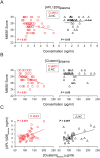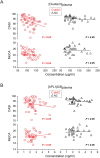A correlativity study of plasma APL1β28 and clusterin levels with MMSE/MoCA/CASI in aMCI patients
- PMID: 26503441
- PMCID: PMC4621490
- DOI: 10.1038/srep15546
A correlativity study of plasma APL1β28 and clusterin levels with MMSE/MoCA/CASI in aMCI patients
Abstract
Amnestic mild cognitive impairment (aMCI) is a sub-clinical condition characterized by memory deficits that are not severe enough to affect daily functioning. Here we investigated two potential biomarkers found in the cerebrospinal fluid of AD patients, APLP1-derived Aβ-like peptides 28 (APL1β28) and clusterin plasma levels, in terms of their relationship to cognitive function, as reflected in the Mini-Mental State Examination (MMSE), the Montreal Cognitive Assessment (MoCA) and the Cognitive Assessment Screening Instrument (CASI) in aMCI patients. Forty-seven aMCI patients and thirty-five age- and gender-matched healthy adult controls were recruited for this study. Using the ELISA method, we found that the mean concentrations of both APL1β28 and clusterin were not significantly different between the control and aMCI groups. The APL1β28 levels were positively correlated with clusterin and that both were negatively correlated with the MMSE scores of the aMCI patients. Clusterin levels were negatively correlated with the MoCA and CASI scores of the aMCI patients. Using multivariate analysis, the correlation between clusterin and MMSE/MoCA/CASI was independent of other AD risk factors including age, education, sex, body mass index and ApoE genotype. The data presented here demonstrate that plasma clusterin levels reflect cognitive function in aMCI patients.
Figures



Similar articles
-
Clusterin Levels in Plasma Predict Cognitive Decline and Progression to Alzheimer's Disease.J Alzheimers Dis. 2015;46(4):1103-10. doi: 10.3233/JAD-150036. J Alzheimers Dis. 2015. PMID: 26402636
-
The role of human kallikrein 6, clusterin and adiponectin as potential blood biomarkers of dementia.Clin Biochem. 2016 Feb;49(3):213-8. doi: 10.1016/j.clinbiochem.2015.10.014. Epub 2015 Oct 26. Clin Biochem. 2016. PMID: 26515085
-
Validity of the Cantonese Chinese Montreal Cognitive Assessment in Southern Chinese.Geriatr Gerontol Int. 2015 Jan;15(1):96-103. doi: 10.1111/ggi.12237. Epub 2014 Jan 24. Geriatr Gerontol Int. 2015. PMID: 24456109
-
Clinical study of central cholinergic pathway damage in two mild cognitive impairment patients.Neurol Sci. 2021 Nov;42(11):4707-4717. doi: 10.1007/s10072-021-05573-9. Epub 2021 Sep 16. Neurol Sci. 2021. PMID: 34528182 Free PMC article.
-
The clinical significance of plasma clusterin and Aβ in the longitudinal follow-up of patients with Alzheimer's disease.Alzheimers Res Ther. 2017 Nov 23;9(1):91. doi: 10.1186/s13195-017-0319-x. Alzheimers Res Ther. 2017. PMID: 29169407 Free PMC article.
Cited by
-
Association between clusterin concentration and dementia: a systematic review and meta-analysis.Metab Brain Dis. 2019 Feb;34(1):129-140. doi: 10.1007/s11011-018-0325-0. Epub 2018 Oct 5. Metab Brain Dis. 2019. PMID: 30291488
-
Dynamics of clusterin protein expression in the brain and plasma following experimental traumatic brain injury.Sci Rep. 2019 Dec 27;9(1):20208. doi: 10.1038/s41598-019-56683-6. Sci Rep. 2019. PMID: 31882899 Free PMC article.
-
Discovery of plasma biomarkers related to blood-brain barrier dysregulation in Alzheimer's disease.Front Bioinform. 2024 Oct 4;4:1463001. doi: 10.3389/fbinf.2024.1463001. eCollection 2024. Front Bioinform. 2024. PMID: 39429696 Free PMC article.
-
Profiling characteristics of plasma exosomal miRNAs across cognitive stages: from normalcy to mild cognitive impairment and Alzheimer's disease.RSC Adv. 2025 Jul 8;15(29):23670-23680. doi: 10.1039/d5ra02993g. eCollection 2025 Jul 4. RSC Adv. 2025. PMID: 40630682 Free PMC article.
-
Integrated Cognitive Assessment: Speed and Accuracy of Visual Processing as a Reliable Proxy to Cognitive Performance.Sci Rep. 2019 Jan 31;9(1):1102. doi: 10.1038/s41598-018-37709-x. Sci Rep. 2019. PMID: 30705371 Free PMC article.
References
-
- Mariani E., Monastero R. & Mecocci P. Mild cognitive impairment: a systematic review. J Alzheimers Dis 12, 23–35 (2007). - PubMed
-
- Lopez O. L. et al. Prevalence and classification of mild cognitive impairment in the Cardiovascular Health Study Cognition Study: part 1. Arch Neurol 60, 1385–1389 (2003). - PubMed
-
- Manly J. J. et al. Implementing diagnostic criteria and estimating frequency of mild cognitive impairment in an urban community. Arch Neurol 62, 1739–1746 (2005). - PubMed
Publication types
MeSH terms
Substances
LinkOut - more resources
Full Text Sources
Other Literature Sources
Medical
Miscellaneous

